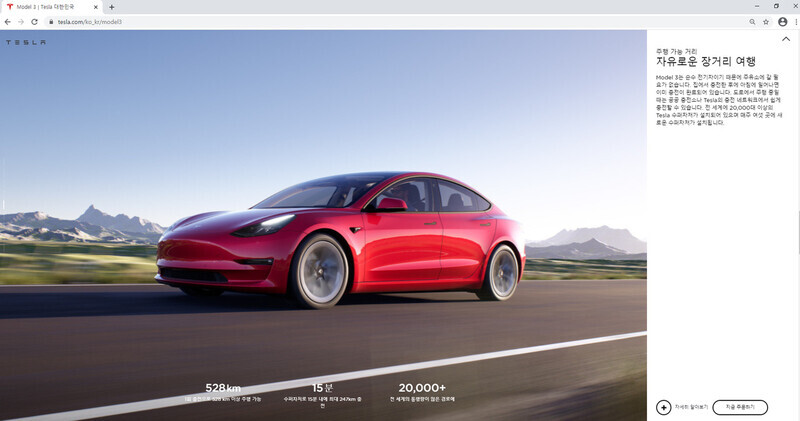hankyoreh
Links to other country sites 다른 나라 사이트 링크
- All
- National
- North Korea
- International
- Eco-Business
- Culture
- Editorial-Opinion
-
The Jeju
April 3rd Incident
1 charge = 528 km drive? Korea slaps Tesla with fine for misleading advertising
Posted on : Jan.4,2023 17:25 KST Modified on : Jan.4,2023 17:25 KST
Tesla is accused of misleading consumers about the driving range of its cars, the performance of its superchargers and expected fuel savings on its Korean homepage from August of 2019 until recently

Tesla is charged with false and misleading advertising about the driving range of its electric cars, the performance of its superchargers and expected fuel savings over five years on its Korean homepage from August of 2018 until recently. (courtesy of the FTC)

Editorial・opinion
![[Column] A year and a half of Yoon’s foreign, security policies has added to Korea risk [Column] A year and a half of Yoon’s foreign, security policies has added to Korea risk](https://flexible.img.hani.co.kr/flexible/normal/500/300/imgdb/original/2023/1226/1517035766989839.jpg) [Column] A year and a half of Yoon’s foreign, security policies has added to Korea risk
[Column] A year and a half of Yoon’s foreign, security policies has added to Korea risk![[Column] Korea’s diaspora discrimination [Column] Korea’s diaspora discrimination](https://flexible.img.hani.co.kr/flexible/normal/500/300/imgdb/original/2023/1225/3417034701814775.jpg) [Column] Korea’s diaspora discrimination
[Column] Korea’s diaspora discrimination- [Column] Climate hypocrisy by rich nations
- [Editorial] Korea’s Supreme Court once again rules Japanese firms must directly compensate forced labor victims
- [Editorial] With right-hand man as interim PPP leader, Yoon to solidify grip on party
- [Editorial] Pope’s OK’ing of blessings for same-sex couples should be wake-up call for Korea
- [Column] China’s insistence on “bright prospects” is stifling its economy
- [Column] Chun Doo-hwan and Roh Tae-woo, Yoon Suk-yeol and Han Dong-hoon
- [Column] Yoon’s oblivious diplomacy ended in expo rout – will it also fail to respond to N. Korea’s nukes?
- [Column] Yoon’s war on Korea’s free press earns him headlines in global news outlets
Most viewed articles
- 1Korea’s top constitutional expert predicts Yoon will be dismissed from office
- 2[Column] Giving Yoon the benefit of the doubt
- 3Korea’s steel industry could buckle under Trump’s tariff war
- 4Human rights watchdog draws criticism for recommending guarantees for Yoon’s right to defense
- 5‘Deeply mortified’: Moon apologizes to Koreans for enabling Yoon’s rise
- 6[Editorial] Choi’s ulterior motives for Seoul police chief appointment
- 7[Interview] South Korea’s Moon Jae-in has his regrets
- 8[Column] Trump may have won, but Yoon will lose
- 9[Editorial] Yoon’s prison politicking sounds a lot like a call to defy court
- 10How China used Korean pop culture for ‘cultural security,’ both before and after banning it